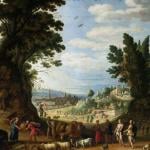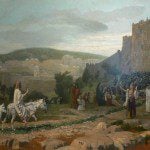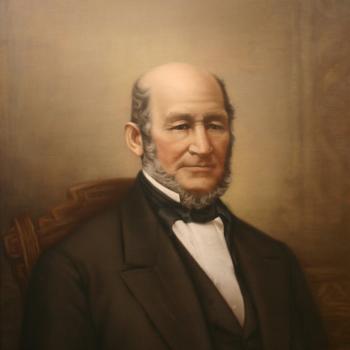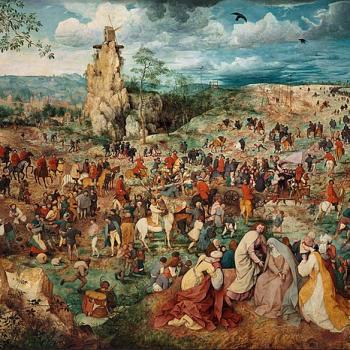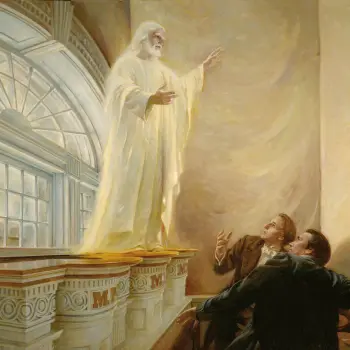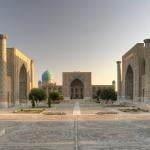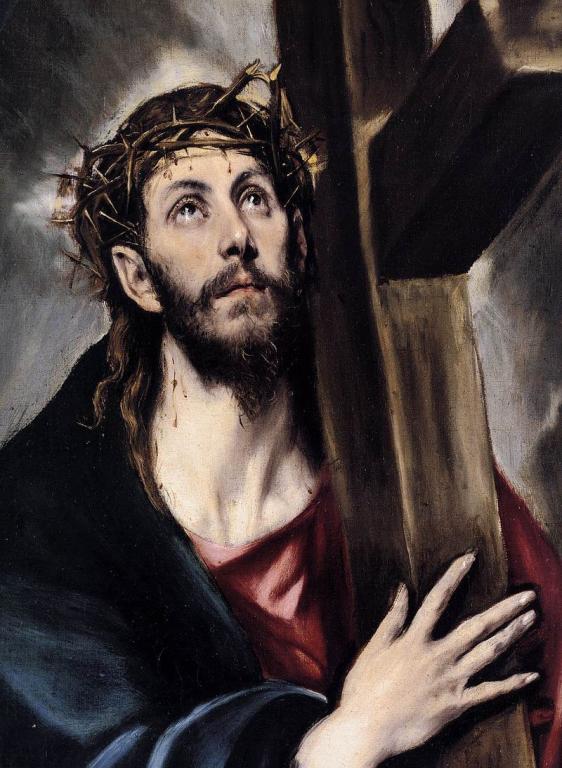
This article went up earlier today in Interpreter: A Journal of Latter-day Saint Faith and Scholarship: “Spiritual Implications of the Timing of the Death of Jesus Christ,” written by C. Thomas Black:
Abstract: Centuries-long speculation continues regarding the circumstances surrounding the death of the Savior. Whether he died sooner than would have been expected, as some scholars believe, or lived longer than expected, statements from the scriptures and modern-day prophets indicate that the Lord died at the exact moment of his choice. According to the Gospels and historical accounts, that moment coincided with the sacrifice of the later of the two daily tamid sacrifices. The tamid had been instituted by Jehovah and symbolized the future atoning sacrifice of the Savior. Each of the other offerings throughout the sacrificial day between the two tamid sacrifices symbolized other qualities of the Lord. The proximity of his death to the Passover suggests an additional association between the two. Ritual prayers offered as the final tamid was being offered coincide further with the missions of the Savior. Jesus Christ chose the moment of his death to synchronize with these events as he symbolically fulfilled the ancient law of sacrifice.
“Spiritual Implications of the Timing of the Death of Jesus Christ” seems especially appropriate for reading and contemplating — as does Dr. Black’s prior Interpreter article, “The Pathophysiology of the Death of Jesus the Christ” — as we approach the commemoration of Good Friday and Easter.
Accompanying Dr. Black’s new article on the Interpreter Foundation’s website is “Interpreting Interpreter: Timing Christ’s Death,” written by Kyler Rasmussen:
This post is a summary of the article “Spiritual Implications of the Timing of the Death of Jesus Christ” by C. Thomas Black in Volume 64 of Interpreter: A Journal of Latter-day Saint Faith and Scholarship. All of the Interpreting Interpreter articles may be seen at https://interpreterfoundation.org/category/summaries/. An introduction to the Interpreting Interpreter series is available at https://interpreterfoundation.org/interpreting-interpreter-on-abstracting-thought/.
A video introduction to this Interpreter article is now available on all of our social media channels, including on YouTube at https://youtube.com/shorts/eZ5PU3I8Ufk.
The Takeaway: Black argues that Christ specifically timed his death to coincide with the evening tamid offering taking place at the temple, with Atonement-based symbolism and Jehovah-oriented prayers that would have punctuated his fulfillment of the law of sacrifice.

I warned you that I was intending to impose at least four poems upon you that, for me, are especially meaningful and particularly apt during “Resurrection Month,” the weeks leading up to Easter Sunday. I’ve already shared two of them, here and here. Now follows the third (and the longest) of them, the “Elegy Written in a Country Churchyard” written by Thomas Gray (1716-1771), which I’ve loved since first I read it as a student in high school:
The curfew tolls the knell of parting day,The lowing herd wind slowly o’er the lea,The plowman homeward plods his weary way,And leaves the world to darkness and to me.
Now fades the glimm’ring landscape on the sight,And all the air a solemn stillness holds,Save where the beetle wheels his droning flight,And drowsy tinklings lull the distant folds;
Save that from yonder ivy-mantled tow’rThe moping owl does to the moon complainOf such, as wand’ring near her secret bow’r,Molest her ancient solitary reign.
Beneath those rugged elms, that yew-tree’s shade,Where heaves the turf in many a mould’ring heap,Each in his narrow cell for ever laid,The rude forefathers of the hamlet sleep.
The breezy call of incense-breathing Morn,The swallow twitt’ring from the straw-built shed,The cock’s shrill clarion, or the echoing horn,No more shall rouse them from their lowly bed.
For them no more the blazing hearth shall burn,Or busy housewife ply her evening care:No children run to lisp their sire’s return,Or climb his knees the envied kiss to share.
Oft did the harvest to their sickle yield,Their furrow oft the stubborn glebe has broke;How jocund did they drive their team afield!How bow’d the woods beneath their sturdy stroke!
Let not Ambition mock their useful toil,Their homely joys, and destiny obscure;Nor Grandeur hear with a disdainful smileThe short and simple annals of the poor.
The boast of heraldry, the pomp of pow’r,And all that beauty, all that wealth e’er gave,Awaits alike th’ inevitable hour.The paths of glory lead but to the grave.
Nor you, ye proud, impute to these the fault,If Mem’ry o’er their tomb no trophies raise,Where thro’ the long-drawn aisle and fretted vaultThe pealing anthem swells the note of praise.
Can storied urn or animated bustBack to its mansion call the fleeting breath?Can Honour’s voice provoke the silent dust,Or Flatt’ry soothe the dull cold ear of Death?
Perhaps in this neglected spot is laidSome heart once pregnant with celestial fire;Hands, that the rod of empire might have sway’d,Or wak’d to ecstasy the living lyre.
But Knowledge to their eyes her ample pageRich with the spoils of time did ne’er unroll;Chill Penury repress’d their noble rage,And froze the genial current of the soul.
Full many a gem of purest ray serene,The dark unfathom’d caves of ocean bear:Full many a flow’r is born to blush unseen,And waste its sweetness on the desert air.
Some village-Hampden, that with dauntless breastThe little tyrant of his fields withstood;Some mute inglorious Milton here may rest,Some Cromwell guiltless of his country’s blood.
Th’ applause of list’ning senates to command,The threats of pain and ruin to despise,To scatter plenty o’er a smiling land,And read their hist’ry in a nation’s eyes,
Their lot forbade: nor circumscrib’d aloneTheir growing virtues, but their crimes confin’d;Forbade to wade through slaughter to a throne,And shut the gates of mercy on mankind,
The struggling pangs of conscious truth to hide,To quench the blushes of ingenuous shame,Or heap the shrine of Luxury and PrideWith incense kindled at the Muse’s flame.
Far from the madding crowd’s ignoble strife,Their sober wishes never learn’d to stray;Along the cool sequester’d vale of lifeThey kept the noiseless tenor of their way.
Yet ev’n these bones from insult to protect,Some frail memorial still erected nigh,With uncouth rhymes and shapeless sculpture deck’d,Implores the passing tribute of a sigh.
Their name, their years, spelt by th’ unletter’d muse,The place of fame and elegy supply:And many a holy text around she strews,That teach the rustic moralist to die.
For who to dumb Forgetfulness a prey,This pleasing anxious being e’er resign’d,Left the warm precincts of the cheerful day,Nor cast one longing, ling’ring look behind?
On some fond breast the parting soul relies,Some pious drops the closing eye requires;Ev’n from the tomb the voice of Nature cries,Ev’n in our ashes live their wonted fires.
For thee, who mindful of th’ unhonour’d DeadDost in these lines their artless tale relate;If chance, by lonely contemplation led,Some kindred spirit shall inquire thy fate,
Haply some hoary-headed swain may say,“Oft have we seen him at the peep of dawnBrushing with hasty steps the dews awayTo meet the sun upon the upland lawn.
“There at the foot of yonder nodding beechThat wreathes its old fantastic roots so high,His listless length at noontide would he stretch,And pore upon the brook that babbles by.
“Hard by yon wood, now smiling as in scorn,Mutt’ring his wayward fancies he would rove,Now drooping, woeful wan, like one forlorn,Or craz’d with care, or cross’d in hopeless love.
“One morn I miss’d him on the custom’d hill,Along the heath and near his fav’rite tree;Another came; nor yet beside the rill,Nor up the lawn, nor at the wood was he;
“The next with dirges due in sad arraySlow thro’ the church-way path we saw him borne.Approach and read (for thou canst read) the lay,Grav’d on the stone beneath yon aged thorn.”
THE EPITAPHHere rests his head upon the lap of EarthA youth to Fortune and to Fame unknown.Fair Science frown’d not on his humble birth,And Melancholy mark’d him for her own.
Large was his bounty, and his soul sincere,Heav’n did a recompense as largely send:He gave to Mis’ry all he had, a tear,He gain’d from Heav’n (’twas all he wish’d) a friend.
No farther seek his merits to disclose,Or draw his frailties from their dread abode,(There they alike in trembling hope repose)The bosom of his Father and his God.
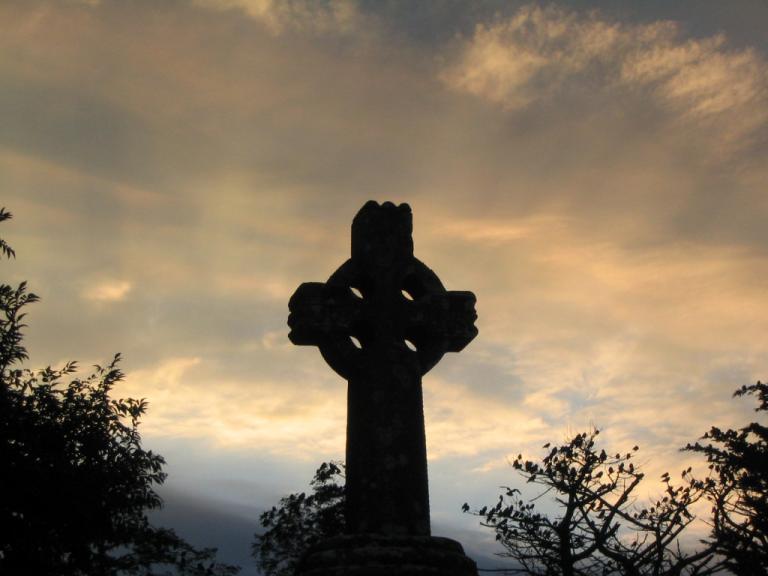
Some of you here know of our friend Don Bradley, and perhaps of his remarkable spiritual journey, and of his contributions to Latter-day Saint scholarship. He and his family have just suffered an almost unimaginable and catastrophic loss, and, earlier this evening, he shared a moving and beautiful tribute to his son, Donnie. If you can access it on Facebook, you’ll have a powerful illustration of why the message of Christ’s resurrection matters so very, very much: https://www.facebook.com/onandagus1


